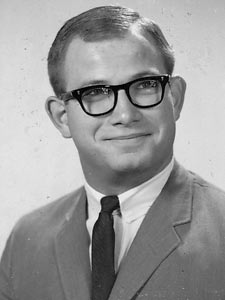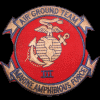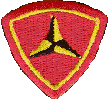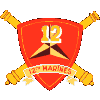| |
|
|
|
John Charles Martin
Second Lieutenant
G BTRY, 3RD BN, 12TH MARINES, 3RD MARDIV, III MAF United States Marine Corps Merced, California July 01, 1944 to August 06, 1968 JOHN C MARTIN is on the Wall at Panel W49, Line 20 See the full profile or name rubbing for John Martin |
 |

|



| |
|
I knew John Charles Martin during college days at Tulane University in New Orleans. We shared a suite in Irby House, an un-air conditioned dorm occupied by a bunch of independent (non-Greek) people. I think it was during my junior year. John was from California. He was incredibly athletic, strong as an ox, but very natural, very low key. His ambition was to graduate from school and go back to California and be a high school coach and teacher. It was all rather simple. It seemed to be the obvious thing to do. He wasn't a rocket scientist, he was a coach. He aspired to be what he would have been best at. What could be more natural? Leading an active life in the sunshine of California, or where ever. Of course, the problem with college is that it is rather intense. In many cases, you do not get to know a whole bunch of people really well. So John and I sort of went through Tulane without really getting to know each other all that well. But I remember a couple of things. One day he came into the suite panting and sweaty. He had finished some gym class, and he and another person had hopped back from the gym to the dorm, a distance of maybe a third of a mile or so. I could not have hopped 20 feet. By hopping, I mean with both legs together, hopping and landing on both feet. He had hopped half way across campus. Another time he told me about coming back from a summer in California to school and his suitcase had been tied to the top of the car with several hundred dollars in it, the gains from his summer job, along with clothes, etc. Well, you guessed it: the suitcase had come off somewhere out in the desert and had not been missed until that night. John took this disaster casually. It was just one of those things. John was extremely strong and was probably a very skillful athlete, but he accepted this gift as other people would accept having ten toes, five on each foot. He was not a lady-killer or a bully. He displayed nothing but good natured thoughts and a desire to enjoy life. I cannot imagine seeing John without a smile on his face. Life just sort of drifted along, and he took what came his way and shaped it the best he could. That hopping contest was a dare or a bet. No money was involved: it was just two guys playing, testing their bodies and exercising them at the same time. His enthusiasm for this contest was incredible. This was because he knew his strength and his skill, and this was the realm in which he was most comfortable: a physical challenge which involved his body. He wasn't interested in politics or intrigues. He would have made the perfect high school coach, I think. Another time I traded some gift packs for peanuts. My mother had sent me a giant can of Spanish peanuts. I had never eaten any of them, because the can just sort of turned me off. Then some promotion firm delivered gift packs to each dorm room, and I told John I would give him the can of peanuts if he would get me some more of the gift packs from his friends. He delivered the bags, and I gave him the peanuts, which he probably ate at one sitting. Then we graduated (in l966) from Tulane. I never expected to see or hear from John again. Soon after graduation, I joined the Army under the OCS program. I went through Basic, AIT and OCS (at the Fort Benning School for Boys), getting married after OCS (I graduated 9 Jun l967) and before reporting to Fort Sill, OK. My wife and I rented a trailer several blocks from the main gate at Fort Sill. We spent weekends prowling around the base, enjoying picnics at various streams and waterfalls. Then one day I ran into John. It turned out that he was an officer in the Marines and that he was at Fort Sill to learn how to be a forward artillery observer. This was not a job that I would have looked forward to doing, since I considered it to be one of the most dangerous jobs in the military. Anyway, I invited him over for dinner. I think John may have had his orders already, and I might have had mine to go to Korea, although I am not exactly sure. The dinner was enjoyable. My wife, Karen, is a good cook. John was his same self: smiling, looking forward to the next challenge, celebrating the victory over past challenges. He related one: staying up all night in an ambush position for a training class while in the Marines in the snow. He talked of how cold he got, along with everybody else. Not much chance of snow in Vietnam, but it was all part of training. Like all physical challenges, he enjoyed it, especially winning and beating the cold. We both must have been on the move, because we only had him over that one time. There were not a lot of things to do at Fort Sill, and I am sure that we would have gotten together with him again if we had the chance. It may have been that he was there for just a short time as part of some other training program. I seem to remember calling him again and being informed that he had left, or he told me he was going to leave in a couple of days, but I am not sure of this. Some time later I found out that he had died. I believe that his college roommate, Vagn Hansen, told me the news. It was either in a letter or in a conversation. Apparently John got to Vietnam and then got sick. The illness was severe, but he seemed to be about over it and was looking forward to getting on with the job when he suddenly died. Before writing this, I e-mailed Vagn. He told me that John's mother died several years ago. John was her only child, and she was a widow, I believe. I imagine that John volunteered for the job of forward observer. The job of the forward observer is to direct artillery fire from a position where he is observing the shell bursts. If the forward observer is on the ground, then he is with a radio man and that is about it. Of course, he may be assigned to a unit in the field, in which case he has some riflemen around him. If he is in a chopper, then he is subject to ground fire, of course. When I saw him at Fort Sill, he was looking forward to the challenge, to this additional test of his ability to win a game. The loss of John represents a terrible waste. He didn't have a mean bone in his body, and his entire life had prepared him for what he was going to do: coach. Then Vietnam intervened, presenting a challenge for which he was not prepared: the disease which overpowered him. It should never have happened. I e-mailed this material to Vagn K. Hansen, his Tulane roommate. Vagn e-mailed back several comments:
The e-mail is dated 8 March 2001.
From a friend, |
| Contact Us | © Copyright 1997-2019 www.VirtualWall.org, Ltd ®(TM) | Last update 08/15/2019 |